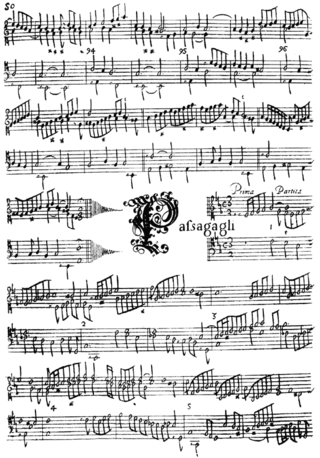Related Research Articles

John Dowland was an English Renaissance composer, lutenist, and singer. He is best known today for his melancholy songs such as "Come, heavy sleep", "Come again", "Flow my tears", "I saw my Lady weepe", "Now o now I needs must part" and "In darkness let me dwell", but his instrumental music has undergone a major revival, and with the 20th century's early music revival, has been a continuing source of repertoire for lutenists and classical guitarists.

Edward Benjamin Britten, Baron Britten was an English composer, conductor, and pianist. He was a central figure of 20th-century British music, with a range of works including opera, other vocal music, orchestral and chamber pieces. His best-known works include the opera Peter Grimes (1945), the War Requiem (1962) and the orchestral showpiece The Young Person's Guide to the Orchestra (1945).

A nocturne is a musical composition that is inspired by, or evocative of, the night.

The passacaglia is a musical form that originated in early seventeenth-century Spain and is still used today by composers. It is usually of a serious character and is often based on a bass-ostinato and written in triple metre.
The 6th Annual Grammy Awards were held on May 12, 1964, at Chicago, Los Angeles and New York. They recognized accomplishments by musicians for the year 1963. Henry Mancini won 4 awards.
In music, variation is a formal technique where material is repeated in an altered form. The changes may involve melody, rhythm, harmony, counterpoint, timbre, orchestration or any combination of these.

Julian Alexander Bream was an English classical guitarist and lutenist. Regarded as one of the most distinguished classical guitarists of the 20th century, he played a significant role in improving the public perception of the classical guitar as a respectable instrument. Over the course of a career that spanned more than half a century, Bream also helped revive interest in the lute.
Sir Lennox Randal Francis Berkeley was an English composer.
Peter Racine Fricker was an English composer, among the first to establish his career entirely after the Second World War. He lived in the US for the last thirty years of his life. Fricker wrote over 160 works in all the main genres excepting opera. He was a descendant of the French playwright Racine.
John William Duarte was a British composer, guitarist and writer.
Mark Delpriora is an American classical guitarist and composer.

Stephen Marchionda is an American virtuoso classical guitar performer.
Bernard (George) Stevens was a British composer who first became known to a wider public when he won a newspaper composition prize for a 'Victory Symphony' in post-war 1946. The broader success was not sustained, but Stevens went on to become a respected composer and teacher at the Royal College of Music, using traditional forms for his compositions while extending his essentially tonal harmonic language towards serialism.
The Melos Ensemble is a group of musicians who started in 1950 in London to play chamber music in mixed instrumentation of string instruments, wind instruments and others. Benjamin Britten composed the chamber music for his War Requiem for the Melos Ensemble and conducted the group in the first performance in Coventry.

Introduction and Variations on a Theme by Mozart, Op. 9, is one of Fernando Sor's most famous works for guitar. It was first published in London in 1821 and dedicated to Sor's brother Carlos.
Variations on a Theme of Frank Bridge, Op. 10, is a work for string orchestra by Benjamin Britten. It was written in 1937 at the request of Boyd Neel, who conducted his orchestra at the premiere of the work at that year's Salzburg Festival. It was the work that brought Britten to international attention.

To a greater extent than most other instruments and ensembles, it is difficult to compose music for the guitar without either proficiency in the instrument or close collaboration with a guitarist. As a result, a large part of the guitar repertoire consists of works by guitarists who did not compose extensively for other instruments. Music prior to the classical era was often composed for performance on various combinations of instruments, and could be adapted by the performer to keyboard instruments, the lute, or the guitar. Since the beginning of the 20th century, however, a significant amount of music has been written for the guitar by non-guitarist composers.
Songs from the Chinese is a song cycle for soprano or tenor and guitar composed in 1957 by Benjamin Britten (1913–76), and published as his Op. 58. It consists of settings of six poems translated from the original Chinese by Arthur Waley (1889–1966). It was written for, and first performed by, the tenor Peter Pears and the guitarist Julian Bream.
Laura Snowden is a British-French classical guitarist and composer. She is widely regarded as one of the leading classical guitarists of her generation since being handpicked by Julian Bream to continue his legacy of performing new commissions by leading contemporary composers, including Julian Anderson and Olli Mustonen.
References
- ↑ Nocturnal after John Dowland : for Guitar, op. 70. WorldCat.org. OCLC 339555.
- ↑ "Nocturnal, op. 70". Guitarnotes. Retrieved 2 August 2013.
- ↑ Wade, Graham (2010). A Concise History of the Classic Guitar. p. 155. "On 12 June 1964, in the quiet seaside town of Aldeburgh, Suffolk, England, Julian Bream premiered Benjamin Britten's Nocturnal after John Dowland, Op.70. The impact of this piece on the accepted guitar repertory was to be revolutionary, .."
- ↑ Goss, Stephen (2001). "Come, Heavy Sleep: Motive & Metaphor in Britten's Nocturnal, Opus 70" (PDF). Guitar Forum. 1: 53–74. Archived from the original (PDF) on 20 April 2019. Retrieved 30 December 2019.